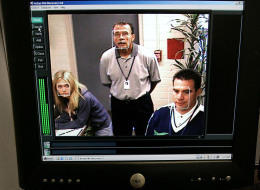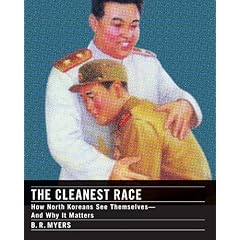Mike Potemra, one of the writers for
National Review Online, wrote a
blog post saying that it was ok for Marc Thiessen (the chief apologist for Bush's torture regime) to expound on his support for torture on a Catholic TV show despite torture being steadfastly against the Catholic catechism, because Marc's conscience dictated that torture was necessary in this case. Mike made it clear he disagreed with that view, but respected Marc's belief, and gave a passionate and decent argument in favor of not throwing someone's religious affiliation in that person's face when making a claim that goes against it.
Having read this rather nice partial defense, I was surprised to read Andy McCarthy post a bile-laced
attack on Mike Potemra for daring to call what the US did torture.
Mike, I'm left wondering what your catechism says about bearing false witness. Your seeming generosity of spirit doesn't alter the fact that, from the very first sentence, your post is a smear. And a careless one, at that. "Not having followed his work in detail"? How do you not bother to look at someone's work before labeling that work the advocacy oftorture, which you proceed to decry as a "great evil"? If you're going to indict someone for a great evil, oughtn't you at least have your facts straight about what he's saying and what he's not saying?
I'm probably beating my head against a post by saying this, but emphatically yes, what we did was torture. I don't care that Marc Thiessen doesn't think it's torture; it's torture and always has been.
It does not matter what kind of definition you use for torture. Here is the
official definition that the US has signed onto:
...any act by which severe pain or suffering, whether physical or mental, is intentionally inflicted on a person for such purposes as obtaining from him, or a third person, information or a confession, punishing him for an act he or a third person has committed or is suspected of having committed, orintimidating or coercing him or a third person, or for any reason based on discrimination of any kind, when such pain or suffering is inflicted by or at the instigation of or with the consent or acquiescence of a public official or other person acting in an official capacity. It does not include pain or suffering arising only from, inherent in, or incidental to, lawful sanctions.
That is from the UN treaty banning torture. Notice: severe pain or suffering, whether physical or mental, intentionally inflicted on a person.
But, just give Andy the largest benefit of the doubt, let's see how he defines it:
Torture is the infliction of severe physical or mental pain or suffering. The physical kind must be excruciating and the mental kind must cause profound and lasting psychological harm.
The biggest difference is the addition of the word "lasting." If the mental harm is not "lasting", then it is not torture to Andy.
So, Andy, what about what happened to this fellow:
He quite likely developed facial tics, an inability to concentrate on his own case, and possibly Stockholm Syndrome. Does that count as "lasting psychological harm" to you?
Again, from Andy: Our law and our practices did not dehumanize the handful of jihadists who were subjected to forcible interrogation tactics. They recognized the personhood of the terrorists, recognized the evil and criminality of torture, and therefore grappled with the reality of torture in order to make certain that our tactics did not cross into that reality.
Really? Many of the tactics used by the US had the effect of removing all personhood and volition from those being tortured. Which is worse: to not think of someone as human, or to (even temporarily) remove their human ability to make decisions for themselves? Because that is exactly what our torture methods do.
We know we used extreme sleep deprivation. To quote a survivor of such treatment by the Russian services:
"In the head of the interrogated prisoner, a haze begins to form. His spirit is wearied to death, his legs are unsteady, and he has one sole desire: to sleep... Anyone who has experienced this desire knows that not even hunger and thirst are comparable with it."
I came across prisoners who signed what they were ordered to sign, only to get what the interrogator promised them."
He did not promise them their liberty; he did not promise them food to sate themselves. He promised them - if they signed - uninterrupted sleep! And, having signed, there was nothing in the world that could move them to risk again such nights and such days."
I'm sure everyone in the world has now seen that quote, but it is still startling. The former prime minister of Israel certainly considered it torture. However, if we want to be more scientific, lack of sleep is associated with a whole host of long-term physical and psychological problems, including psychosis. So, even by Andy's clumsy standard, it is torture. The same is true for many of the "coercive techniques" used by the US. Don't forget that it was "stress positions" (another of the techniques we are using) that so badly damaged John McCain's arms that he can no longer raise them above his head.
And waterboarding. Waterboarding explicitly removes all volition from the person it's being used on. Remember: waterboarding does not just cause the "fear of death" in the mind of the tortured. It causes the body to think it is dying.
If you want to defend torture, than defend torture. Do not pretend there is even a modicum of intelligent debate about whether or not it was torture. I cannot come up with even a single justification that passes muster with me, but this is just pathetic.
Update: Marc Thiessen has also
chimed in. This is the most ridiculous part:
Before his capture, KSM had set in motion a number of terrorist attacks, which I recount in my book. When asked about his plans for attacks, he replied: “Soon you will know.” By withholding this information, he held in his hands the lives of thousands of people. Even while sitting in a CIA black site, he remained an unjust aggressor who still possessed the power to kill. The government had a moral responsibility to “render him unable to do harm” by compelling him to divulge this information. If we had not done so, and the attacks he planned had gone forward — if we allowed him to withhold that information — we would have abdicated the “grave responsibility” assigned to us in the Catechism to protect the innocent from unjust aggression.
In that case, if an American soldier is captured on the field and might have knowledge of upcoming Predator strikes against the Taliban, would they be justified in torturing him to release that information? I dare you to say yes.














